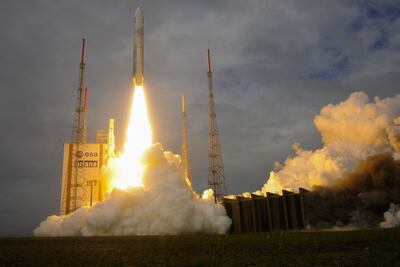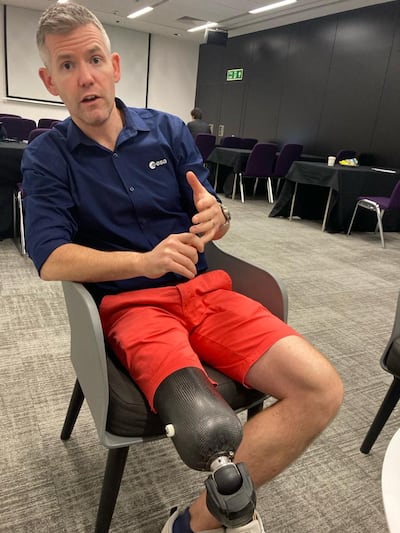For John McFall, being an astronaut is not just about space travel – it's also an opportunity to inspire children to never quit on their dreams.
Having had one leg amputated above the knee as a teenager, he is a remarkable inspiration for young people to aim high.
“I've done sports, been a surgeon, and I can say to children: 'Listen, go out there and do things you enjoy, try stuff, don't be afraid to fail. It can be difficult and it gets tough but you can do it,'” he said.
Mr McFall faces major challenges himself over the next year as he aims to become the world’s first physically disabled person in space.
The Briton needs to prove that a person with a prosthetic leg can function for months in space.
Other hurdles need to be overcome too, such as: could he make an emergency evacuation of the space capsule on the launch pad in the short time required?
The answer to that is almost certainly yes, as the trainee astronaut was a bronze-medal-winning 100-metre sprinter for Great Britain in the 2008 Paralympics and won a silver at the 2006 World Championships.
In an interview with The National, the budding spaceman spoke of the lure of the unknown and the challenges, including being away from his young family.
High achievements are clearly his goals, but why become an astronaut?
“It's a profession where you get to use your brain, to use your hands a lot and it's a practical job, but I've also always wanted to be someone who gets out of bed every morning going to do a job that inspires me,” he said.
He really enjoys inspiring the younger generation. “It’s about what are the possibilities in one's life.
“Yes, very few people become an astronaut, but we can spread the message about the importance, interest and excitement that learning science, technology, engineering and maths can give you.”
He added: “Being an astronaut is a really useful platform to spread those messages and, of course, there is the overarching benefit to humanity from the science that you can do in space.”
Sprinter, surgeon, spaceman
Not content with representing his country or becoming a trauma surgeon, Mr McFall then set his sights on going into space.
Becoming an astronaut is usually the fanciful ambition of youths, but the 42-year-old competed against 22,500 other applicants to be accepted on to the European Space Agency’s astronaut programme.
That grit and spirit comes from refusing to be cowed by the above-knee amputation he endured following a motorcycle accident in Thailand, aged just 19.
A promising hockey player who excelled at Millfield School in Somerset, and who was set on following his father into the Parachute Regiment, he could easily have been overwhelmed by the adversity.
Instead, he learnt to run again at university, and that led to an international sports call-up.
When Mr McFall realised that being a disabled athlete was not a long-term career, he decided to become a surgeon.
Aged 28, he entered medical school and within a decade became a trauma surgeon.
His determination and physicality were welcomed by the European Space Agency when in 2022 it set out to recruit the first astronaut with a physical disability.

Space inspiration
Over the next year Mr McFall will complete a feasibility study that determines whether he will be able to travel into space.
“The study will pick apart all the intricacies to understand what it would take to get someone with a physical disability like mine to go on a long-duration mission to the International Space Station,” he said.
So long as there is “no showstopper” he should get signed off for space flight training in 2025.

Launch pad dash
A key part of the feasibility study will be examining his disability and various emergency scenarios.
“When the spacecraft is on the launch pad you have to be capable in an emergency of escaping and running down the crew access arm into a gondola to take you down to a safe area,” he explained.
“I have to wear a prosthesis as I couldn't hop to safety and that has to be safe inside a spacesuit that's pressurised with the leg’s microprocessor batteries, electronics and hydraulic fluid.”
The safety review will be conducted by panels at both ESA and Nasa to see if he could carry out a long mission or one on the moon.
Mr McFall will also have to complete studies using a running machine or bike while in zero gravity wearing a prosthesis as he will need to maintain muscle mass on long missions.
However, zero gravity will also mean that for the first time since he was a teenager he may not need to wear a false leg while at work.

Brainteaser
Out of the 22,500 who applied for the programme, five made it through as career astronauts, then Mr McFall as the sole physical disability candidate and 11 others as reserves.
The gruelling six-stage process, which culminated in an interview with ESA chief Josef Aschbacher, required physical, cognitive, psychomotor and spatial awareness tests.
One of those was a brain test. “You’re given voice commands to rotate a cube in your head, so it's left, left, right, left, left, back, forward, back, back and there's a cross on the cube and you've got to work out where that cross ends up.”
Much of his time is now spent at the European Astronaut Centre in Cologne, Germany, with weeks away from his wife and three young children.
His children think that being an astronaut is “cool”.
The idea of him being away in space, operating with one leg, is a challenge both for him and his family but something the astronaut appears well equipped to overcome.


